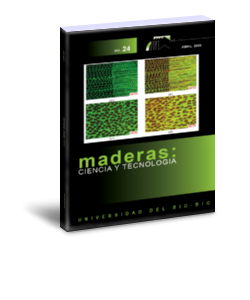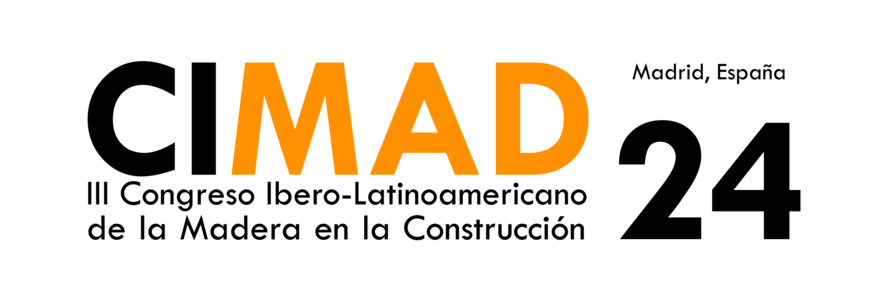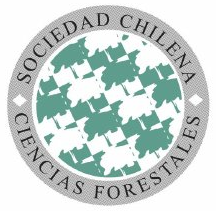Plywoods of northeast argentinian woods and soybean protein-based adhesives: Relationship between morphological aspects of veneers and shear strength values
DOI:
https://doi.org/10.4067/s0718-221x2022000100403Keywords:
Biogenic adhesive, bonding quality, mechanical properties, plywood, wood taxonomyAbstract
Three-ply plywoods were produced using pine and Eucalyptus northeast Argentinian woods. A no-added formaldehyde biobased-adhesive was used for assembly, based on chemically modified soy protein concentrate. In this work we focused on the relationship between bonding quality parameters of the plywoods and the morphology of the glued line. Wood characteristics such as contact angle, roughness, density and moisture content were measured prior to plywood assembly. Bonding quality parameters (percentage of wood failure and shear strength) of the plywood were measured according to Argentinean standard IRAM 9562 and the results were evaluated with respect to microscopic observations of the glue joint. Eucalyptus wood was suitable for plywood interior condition applications, while pine barely exceeded the standards imposed by the norm.
Downloads
References
Ang, A.F.; Ashaari, Z.; Lee, S.H.; Tahir, P.M.; Halis, R. 2019. Lignin-based copolymer adhesives for composite wood panels–A review. Int J Adhes Adhes 95: 102408. https://doi.org/10.1016/j.ijadhadh.2019.102408
ASA American Soybean Association 2020. Soy stats Report. United States. https://soygrowers.com/wp-content/uploads/2020/05/SoyStats2020_for-WEB.pdf
Aydin, I.; Colakoglu, G. 2007. Variation in surface roughness, wettability and some plywood properties after preservative treatment with boron compounds. Build Environ 42(11): 3837-3840. https://doi.org/10.1016/j.buildenv.2006.11.009
Boehme, C.; Hora, G. 1996. Water absorption and contact angle measurement of native European, North American and tropical wood species to predict gluing properties. Holzforschung 50(3): 269-276. https://doi.org/10.1515/hfsg.1996.50.3.269
Buddi, T.; Mahesh, K.; Muttil, N.; Rao, B.N.; Nagalakshmi, J.; Singh, S.K. 2017. Characterization of plywoods produced by various bio-adhesives. Mater Today 4(2): 496-508. https://doi.org/10.1016/j.matpr.2017.01.050
Bulfe, N.M. L; Fernández, M.E. 2017. Anatomía funcional del leño juvenil de Pinus taeda L: variabilidad genotípica y plasticidad anatómica ante déficit hídrico. Revista de la Facultad de Agronomía, La Plata 116(2): 225-240. https://revistas.unlp.edu.ar/revagro/article/view/6177
Calvo, C.F.; Cotrina, A.; Cuffré, A.G.; Piter, J.; Stefani, P.M.; Torrán, E.A. 2006. Variación radial y axial del hinchamiento, del factor anisotrópico y de la densidad, en el Eucalyptus grandis de Argentina. Maderas-Cienc Tecnol 8(3):159-168. http://dx.doi.org/10.4067/S0718-221X2006000300003
Ciannamea, E.; Martucci, J.; Stefani, P.; Ruseckaite, R. 2012. Bonding Quality of Chemically‐Modified Soybean Protein Concentrate‐Based Adhesives in Particleboards from Rice Husks. J Am Oil Chem Soc 89(9): 1733-1741. https://doi.org/10.1007/s11746-012-2058-2
Ciannamea, E.M.; Marin, D.; Ruseckaite, R.A.; Stefani, P. M. 2017. Particleboard Based on Rice Husk: Effect of Binder Content and Processing Conditions. J Renew Mater 5(5): 357-362. https://doi.org/10.7569/JRM.2017.634125
Ciannamea, E.M.; Stefani, P.M.;. Ruseckaite, R.A. 2010. Medium-density particleboards from modified rice husks and soybean protein concentrate-based adhesives. Bioresour Technol 101(2): 818-825. https://doi.org/10.1016/j.biortech.2009.08.084
Chalapud, M.C.; Herdt, M.; Nicolao, E. S.; Ruseckaite, R.A.; Ciannamea, E.M.; Stefani, P.M. 2020. Biobased particleboards based on rice husk and soy proteins: Effect of the impregnation with tung oil on the physical and mechanical behavior. Constr Build Mater 230: 116996. https://doi.org/10.1016/j.conbuildmat.2019.116996
Chandler, J.G.; Brandon, R.L.; Frihart, C.R . 2005. Examination of adhesive penetration in modified wood using fluorescence microscopy. ASCSpring 2005 Convention and Exposition: April 17-20, Columbus, OH.[Bethesda, Md.: Adhesive and Sealant Council, 2005]: 10 p. https://www.fs.usda.gov/treesearch/pubs/23115
Denne, M. P. 1989. Definition of latewood according to Mork (1928). IAWA J 10(1): 59-62. https://doi.org/10.1163/22941932-90001112
FAOSTAT 2018. Food and Agriculture Organization of the United Nations. Rome, Italy. http://www.fao.org/faostat
Frihart, C.R. 2005. Adhesive bonding and performance testing of bonded wood products. In Advances in Adhesives, Adhesion Science, and Testing. Damico, D. (ed.), West Conshohocken, PA: USA. ASTM International. 1-12. https://doi.org/10.1520/STP11654S
Frihart, C.R.; Hunt, C.G. 2010. Wood handbook: wood as an engineering material. Centennial ed. General technical report FPL; GTR-190. Madison, WI: US Dept. of Agriculture, Forest Service, Forest Products Laboratory. https://www.fpl.fs.fed.us/documnts/fplgtr/fpl_gtr190.pdf
Frihart, C.R.; Birkeland, M.J. 2014. Soy properties and soy wood adhesives. Soy based chemicals and materials. J Am Chem Soc https://doi.org/10.1021/bk-2014-1178.ch008
Ghahri, S.; Chen, X.; Pizzi, A., Hajihassani, R.; Papadopoulos, A.N. 2021. Natural Tannins as New Cross-Linking Materials for Soy-Based Adhesives. Polymers 13(4): 595. https://doi.org/10.3390/polym13040595
Goche Télles, J.R.; Velázquez Martínez, A.; Borja de la Rosa, A.; Capulín Grande, J.; Palacios Mendoza, C. 2011. Variación radial de la densidad básica en Pinus patula Schltdl. et Cham. de tres localidades en Hidalgo. Rev Mex Cienc Forestales 2(7): 71-78. http://www.scielo.org.mx/scielo.php?script=sci_arttext&pid=S2007-11322011000500006
Hunt, C.G.; Frihart, C.R.; Dunky, M.; Rohumaa, A. 2018. Understanding wood bonds–going beyond what meets the eye: a critical review. RAA 6(4): 369-440. https://doi:10.7569/RAA.2018.097312
Instituto argentino de normalización y certificación. 2006. Norma IRAM 9562:2006: Determinación de la calidad de encolado. Buenos Aires, Argentina.
Instituto Argentino De Normalización y certificación. 1963. Norma IRAM 9532: Método de determinación de la humedad. Buenos Aires. Argentina.
Instituto Argentino De Normalización y certificación. 1973. Norma IRAM 9544: Método de determinación de la densidad aparente. Buenos Aires. Argentina.
Jakes, J.E.; Frihart, C.R.; Hunt, C.G.; Yelle, D J.; Plaza, N.Z.; Lorenz, L.; Grigsby, W.; Ching, D.J.; Kamke, F.; Gleber, S.C. 2019. X-ray methods to observe and quantify adhesive penetration into wood. J Mater Sci 54(1): 705-718. https://doi.org/10.1007/s10853-018-2783-5
Kamke, F.A.; Lee, J.N. 2007. Adhesive penetration in wood-a review. Wood Fiber Sci 39(2): 205-220. https://wfs.swst.org/index.php/wfs/article/view/641
Kumar, R.; Choudhary, V; Mishra, S.; Varma I.K.; Mattiason, B. 2002. Adhesives and plastics based on soy protein products. Ind Crop Prod 16(3): 155-172. https://doi.org/10.1016/S0926-6690(02)00007-9
Liu, Y.; Li, K. 2002. Chemical modification of soy protein for wood adhesives. Macromol Rapid Commun 23(13): 739-742. https://doi.org/10.1002/1521-3927(20020901)23:13<739::AID-MARC739>3.0.CO;2-0
Marra, A.A., 1992. Technology of wood bonding: principles in practice. Van Nostrand. New York, United States.
Mo, X.; Sun, X.S. 2013. Soy proteins as plywood adhesives: formulation and characterization. J Adhes Sci Technol 27(18-19): 2014-2026. https://doi.org/10.1080/01694243.2012.696916
Monteoliva, S.; Barotto, A.J.; Fernandez, M.E. 2015. Anatomía y densidad de la madera en Eucalyptus: variación interespecífica e implicancia en la resistencia al estrés abiótico. Rev Fac Agro 114(2): 209-217. http://revista.agro.unlp.edu.ar/index.php/revagro/article/view/130
Nicolao, E.; Leiva, P.; Chalapud, M.; Ruseckaite, R.; Ciannamea, E.; Stefani, P. 2020. Flexural and tensile properties of biobased rice husk-jute-soybean protein particleboards. J Build Eng 101261. https://doi.org/10.1016/j.jobe.2020.101261
Nordqvist, P.; Nordgren, N.; Khabbaz, F.; Malmström, E. 2013. Plant proteins as wood adhesives: Bonding performance at the macro-and nanoscale. Ind Crops Prod 44: 246-252. https://doi.org/10.1016/j.indcrop.2012.11.021
Oliveira de, R.G.; Gonçalves, F.G.;. Segundinho, P.G. de A.; Oliveira, J.T. da S.; Paes, J. B; Chaves, I.L.;. Brito, A.S. 2020. Analysis of glue line and correlations between density and anatomical characteristics of Eucalyptus grandis× Eucalyptus urophylla glulam. Maderas-Cienc Tecnol 22(4): 495-504. http://dx.doi.org/10.4067/S0718-221X2020005000408
Palacios Mendoza, C. 2011. Variación radial de la densidad básica en Pinus patula Schltdl. et Cham. de tres localidades en Hidalgo. Rev Mex Cienc Agric 2(7): 71-78. http://www.scielo.org.mx/scielo.php?pid=S2007-11322011000500006&script=sci_arttext
Papp, E.A.; Csiha, C. 2017. Contact angle as function of surface roughness of different wood species. Surf Interfaces 8: 54-59. https://doi.org/10.1016/j.surfin.2017.04.009
Piter, J.; Cotrina A.; Zitto, M.S.; Stefani, P.M.; Torrán, E. 2007. Determination of characteristic strength and stiffness values in glued laminated beams of Argentinean Eucalyptus grandis according to European standards. Holz Roh Werkst 65(4): 261-266. https://doi.org/10.1007/s00107-006-0161-5
Pizzi, A. 2006. Recent developments in eco-efficient bio-based adhesives for wood bonding: opportunities and issues. J Adhes Sci Technol 20(8): 829-846. https://doi.org/10.1163/156856106777638635
Plinke, B. 2002. Automatic determination of wood fibre failure percentage of plywood shear samples Wood based materials. In Wood composites and chemistry : International symposium, September 19-20, 2002. Vienna, Austria Wien, pp.247-256 http://publica.fraunhofer.de/documents/N-15521.html
Rohumaa, A.; Hunt, C.G.; Hughes, M., Frihart; C.R., Logren, J. 2013. The influence of lathe check depth and orientation on the bond quality of phenol-formaldehyde–bonded birch plywood. Holzforschung 67(7): 779-786. https://doi.org/10.3390/polym13040595
Rowell, R.M. 2012. Handbook of wood chemistry and wood composites. CRC press. United States.
Salthammer, T.; Mentese, S.; Marutzky, R. 2010. Formaldehyde in the indoor environment. Chem Rev 110(4): 2536-2572. https://doi.org/10.1021/cr800399g
Sánchez Acosta, M.; Zakowicz, N.; Harrand, L.; Cuffre, A.; Torran, E.; Calvo P.J. 2005. Propiedades físico mecánicas de la madera de Eucalyptus grandis de las procedencias genéticas: Kendall (Australia), Huerto semillero de Sudáfrica y semilla local Concordia, plantadas comercialmente en Argentina. In Congreso Mundial IUFRO. Entre Rios, Argentina.
Scheikl, M.; Dunky,M. 1998. Measurement of dynamic and staue contact angles on wood for the determination of its surface tension and the penetration of liquids into the wood surface. Holzforschung 52(1): 89 94. https://doi.org/10.1515/hfsg.1998.52.1.89
Stefani, P.M.; Peña C.; Ruseckaite, R.A.; Piter, J.; Mondragon, I. 2008. Processing conditions analysis of Eucalyptus globulus plywood bonded with resol-tannin adhesives. Bioresour Technol 99(13): 5977-5980. https://doi.org/10.1016/j.biortech.2007.10.013
Vázquez, G.; Galinanes, C.; Freire, M.S.; Antorrena, G.; González-Alvarez, J. 2011. Wettability study and surface characterization by confocal laser scanning microscopy of rotary-peeled wood veneers. Maderas-Cienc Tecnol 13(2): 183-192. https://doi.org/10.4067/S0718-221X2011000200006
Wang, F.; Wang, J.; Chu, F.; Wang, C.; Jin, C.; Wang, S.; Pang, J. 2018. Combinations of soy protein and polyacrylate emulsions as wood adhesives. Int J Adhes Adhes 82: 160-165. https://doi.org/10.1016/j.ijadhadh.2018.01.002
Wolkenhauer, A.; Avramidis, G.; Hauswald, E.; Militz, H.; Viöl,W. 2009. Sanding vs. plasma treatment of aged wood: A comparison with respect to surface energy. Int J Adhes Adhes 29(1): 18-22. https://doi.org/10.1016/j.ijadhadh.2007.11.001
Xi, X.; Pizzi, A.; Frihart,C.; Lorenz, L.; Gerardin, C. 2020. Tannin plywood bioadhesives with non-volatile aldehydes generation by specific oxidation of mono-and disaccharides. Int J Adhes Adhes 98: 102499. https://doi.org/10.1016/j.ijadhadh.2019.102499
Downloads
Published
How to Cite
Issue
Section
License

This work is licensed under a Creative Commons Attribution 4.0 International License.
Los autores/as conservarán sus derechos de autor y garantizarán a la revista el derecho de primera publicación de su obra, el cuál estará simultáneamente sujeto a la Licencia de Reconocimiento de Creative Commons CC-BY que permite a terceros compartir la obra siempre que se indique su autor y su primera publicación esta revista.




































